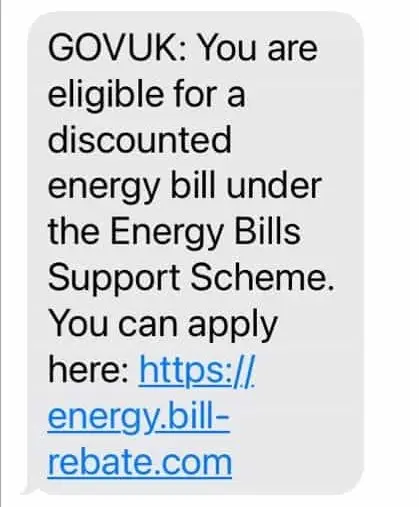
WARNING! New energy bill rebate scams!
The UK government has announced that qualifying households will receive £400 off their energy bills starting in October this year. This act has been put into place in order to help alleviate some of the burden that many families are currently facing due to the pandemic, inflation and worldwide gas prices situation. The rising cost of living makes people lose their vigilance, wanting to believe that they are entitled to certain additional benefits.
However, scammers have already taken advantage of this situation by sending text messages and emails claiming to be from the government in order to get people's personal information such as bank account numbers or utility bills.
The scale of this fraud is extremely worrying and continues to grow, costing unsuspecting Britons almost a million of pounds lost to fraud every month.
What a fraudulent message looks like?

The message states that it is sent from a government website - which is untrue, it also leads to fake and malicious website that aims to collect your personal details for scamming purposes..
BBC News reports that the fake links you can find in the messages are: energy-bill-online.com, myenergybillonline.com, rebate-ogem.com, totalsolutions24-7.co.uk, energy.bill-rebate.com.
The link directs you to a webpage that requests personal information under the premise that this will make you eligible for some sort of scheme. The page says, “We need this information to determine how much you are eligible for. This information will only be provided to your energy supplier”, when asking for sensitive details like personal and financial details, date of birth, phone number and address.
After the user enters their energy supplier, they are then asked to input their credit card information including the number, expiry date and security code to get your energy rebate.
In some cases, the scammers may even ask for access to your online banking account so they can set up a direct debit for the 'rebate'. Of course, once they have your details they can use them to defraud you in other ways, especially with further scam emails.
Remember that your electricity and gas supplier will calculate the rebate automatically. It will not contact you by text message or email!
What does a phishing email for an energy bill rebate look like?

Some people were contacted by the scammers by email. At first glance, the message looked very credible. It had the logo of energy suppliers or the OFGEM logo and all the necessary information- most of them impersonate the energy regulator OFGEM or other genuine organisations.
This is why it is so important to be vigilant and never under any circumstances click on any links and you will not be sure that the e-mail is genuine.
Check email subject header, what address it was sent from, whether such a domain even exists, and whether there are any spelling and grammar errors.
If you have any doubts about the authenticity of an email contact your energy supplier and ask if they have tried to contact you. Use phone numbers from the official website - never from an email you have received - they may not be genuine either.
What to do if I am a victim of energy bill rebate fraud?

If you have received a similar message and provided your personal details or bank details, financial information or, worst of all, your card details, contact your bank immediately. They will issue a refund.
You should also report the crime to Action Fraud by visiting www.actionfraud.police.uk or calling 0300 123 2040. The National Fraud Intelligence Bureau, which operates alongside Action Fraud within the London Police force, is also involved in this case. Any attempt to exploit consumers of energy suppliers is taken very seriously.
National Cyber Security Centre is asking for sending suspicious emails to [email protected] and text messages to 7726.
Be aware of the risks associated with the energy bill rebate scheme

The cost of living crisis is something that many people are all too familiar with. So when an energy bill rebate scam promising a refund on your energy bills comes along, it can be tempting to take the bait.
Unfortunately, these scams are becoming increasingly common as people become more desperate for ways to ease the financial burden of the cost of living crisis. So be vigilant and warn your friends and family about these dangers so that they don't fall victim to them either.
Some simple tips to remember:
Never click on links or enter personal and financial information in response to an unsolicited message, no matter how tempting it may be.
If you're unsure about a message, contact your energy provider directly to check if a rebate is available.
Be vigilant and warn your friends and family about these scams so that they don't fall victim to them either.
Follow the website of your energy regulator. Most have issued their own warnings and practices on how they will contact customers. Protecting consumers is their top priority.
Unfortunately, the truth is that no matter how much they do, you need to remain aware and calm, knowing that scammers are not sleeping and will do anything to scam you out of your money. Today it will be the emails and messages presented in the article, but tomorrow they will find a completely different way that you may not have read or heard about yet. You need to know that the threat is real.
Unfortunately, it has come to the point where you have to treat every attempt to contact a state institution in advance as a scam, check, verify and then respond. Scammers are so sneaky that they will contact the most vulnerable customers first, such as elderly people who are not in touch with social media and perhaps not with up to date information. There is a lot of talk about this, but it is still not enough - because so many people are still being victimised by scammers. Be aware and talk to others about it!